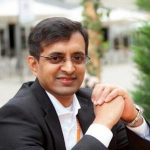December 17, 2018
WORKSHOP 1 – Wireless Connectivity Through Edge Technology
10.30 AM – 10.35 AM – Introduction to the Workshop by Dr. Vimal Bhatia
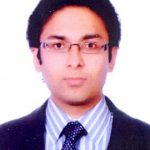 Dr. Vimal Bhatia, Professor, Electrical Engineering, IIT-Indore
Dr. Vimal Bhatia, Professor, Electrical Engineering, IIT-Indore
Bio: Dr. Vimal has mix of academic and industrial experience both in India and the UK. He completed Ph.D. from Institute for Digital Communications at The University of Edinburgh (UoE), UK in 2005 fully funded by UK Engineering and Physical Science Research Council (EPSRC) and The University of Edinburgh. During Ph.D. he also received IEE fellowship for collaborative research on OFDM with Prof. Falconer at Department of Systems and Computer Engineering at Carleton University, Ottawa, Canada. He has worked in various positions in the UK and in India. His research interests are in the broader areas of non-Gaussian non-parametric signal processing with applications to wireless communications, audio video signal processing, telecommunications and in software product development.
He is currently PI for externally funded projects of over Rs. 12.5 Crores (USD 1.9 million) with major funding from Ministry of Electronics and Information Technology, Department of Science and Technology, and UKIERI. He is a reviewer for IEEE, Elsevier, and IET. He is currently Senior Member of IEEE and certified SCRUM Master. He is also General Co-Chair for IEEE ANTS 2018, and General Vice-Chair for IEEE ANTS 2017. He is also faculty convenor for Center for Innovation and Entrepreneurship.
10.35 AM – 11.20 AM
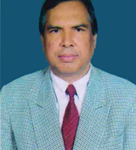 Professor Ganapati Panda, FNAE, FNASc, FIET(UK) – Professorial Fellow at IIT, Bhubaneswar
Professor Ganapati Panda, FNAE, FNASc, FIET(UK) – Professorial Fellow at IIT, Bhubaneswar
Title: Strategies for minimizing energy consumption in the access networks
Bio: During 2009-13, Professor Panda served as the Deputy Director of IIT, Bhubaneshwar. Prior to this, he was working as Dean (Academic Affairs) and Head, School of Electrical Sciences of this Institute. He also served as Dean (Administration) at National Institute of Technology, Rourkela. He was a member of Board of Governors of IIT Bhubaneswar and NIT Rourkela. He was the founder Head of School of Electrical Sciences at IIT Bhubaneswar as well as the founder Head of Electronics and Communication Engineering department of NIT Rourkela. He also served as Director of National Institute of Technology, Jamshedpur. He also acted as Co-ordinator, World Bank Project at National Institute of Technology, Rourkela. He has served 47 years in teaching and research in leading technical institutions of Odisha like College of Engineering Burla (16 years), National Institute of Technology, Rourkela (22 years) and Indian Institute of Technology, Bhubaneswar (9 years). He did his Post-Doctoral research work at the University of Edinburgh, UK (1984-86) and Ph. D. from IIT, Kharagpur in 1981 in the area of Electronics and Communication Engineering. He has already guided 38 Ph.Ds in the field of Signal Processing, Communication and Soft- computing. He has published more than 365 research papers in various referred International and Indian Journals and Conferences with 8784 citations, h-index of 47 and i-index of 150. Two more PhD students are continuing their PhD work under his active guidance. Most of his research papers are extensively cited. He has successfully completed number of research projects from AICTE, MHRD, ISRO, DRDO, DST and British Council, UK. He has also edited two books in the area of DSP.
He was nominated as the Fellow of the National Academy of Engineering, India (FNAE) and Fellow of National Academy of Science, India (FNASc) for his significant research contribution to signal processing and telecommunication. He has been awarded with Outstanding Teacher Award by INAE in 2017 for outstanding contribution to engineering, education and research. For the year 2012, Dr. Panda has received Biju Patnaik award for Scientific Excellence in recognition of his outstanding life time contributions in the field of science and technology. He also received Samanta Chandra Sekhar award from the department of Science and Technology, Govt. of Orissa for his high quality research work in the field of Engineering. He is a Senior Member of IEEE, Fellow of IET, Fellow of IETE, Fellow of IE, Life Member of CSI, Life Member of ISTE and Life Member of System Society. He is a regular reviewer of many international journals including IEEE, IET and Elsevier. He has chaired and delivered keynote addresses in many international conferences in India and abroad. He has travelled extensively in India and abroad. His research interests are Digital Signal Processing, Digital Communication, Soft Computing, Intelligent Instrumentation, Evolutionary Computing, Computational Finance, Sensor Networks and Distributed Signal Processing.
11.20 AM – 12.10 PM
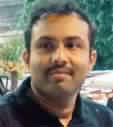 Dr. B. N. Bharath , Asst.Professor, Dept of Electrical Engineering, IIT-Dharwad, India
Dr. B. N. Bharath , Asst.Professor, Dept of Electrical Engineering, IIT-Dharwad, India
Title: Caching in 5G Cellular Networks
Bio: Dr. Bharath B.N. is an . He completed his B.E. degree in Electrical and electronics from B. M. S. college of engineering in 2005. After a short stint in the industry, he joined as a direct Ph.D student in the ECE Dept. of IISc, Bangalore in 2007. The main focus of his Ph.D thesis was on channel estimation for reciprocal MIMO point-to-point and cellular communication systems.
After completion of his Ph.D in 2013, he worked at Qualcomm Inc, Bangalore from 2013 July to 2014 August as a senior engineer. At Qualcomm, he helped in the design and development of 3G and 4G modem systems. He joined PESIT BSC as a professor in Sep. 2014 where he taught graduate and undergraduate students as well as conducted research in the broad area of next generation wireless networks.
His research interests are in the broad area of signal processing and machine learning for communication problems.
December 17, 2018
WORKSHOP 2 – Green ICT for Next Generation Wireless Networks
02.20 PM – 02.35 PM – Introduction to workshop by Dr.Anand Srivastava
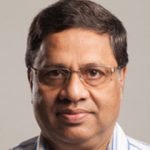 Dr.Anand Srivastava, Dean and Professor, Electronics & Communication Engineering, IIIT- Delhi.
Dr.Anand Srivastava, Dean and Professor, Electronics & Communication Engineering, IIIT- Delhi.
Bio: Dr.Anand Srivastava did his M.Tech. and Ph.D. from IIT Delhi. Before joining IIIT Delhi, he was Dean & Professor in School of Computing and Electrical Engineering at Indian Institute of Technology Mandi, HP, India and also Adjunct Professor at IIT Delhi. Prior to this, he was with Alcatel-Lucent-Bell Labs, India as solution architect for access and core networks. Before joining Alcatel Lucent, he had a long stint (∼ 20 years) with Center for Development of Telematics (C-DOT), a telecom research center of Govt. of India where he was Director and Member of C-DOT Board. During his stay in C-DOT, he provided technical leadership and motivation to extremely qualified team of about 150+ engineers engaged in the development of national level projects in the areas of Telecom Security Systems, Network Management System, Intelligent Networks, Operations Support Systems, Access Networks (GPON) and Optical Technology based products. Majority of these projects were completed successfully and commercially deployed in the public network. He was also closely involved with ITU-T, Geneva in Study Group 15 and represented India for various optical networking standards meetings. His research work is in the area of optical core & access networks, Fiber-Wireless (FiWi) architectures, optical signal processing, Visible light communications (VLC) and energy aware optical networks.
02.35 PM – 03.20 PM
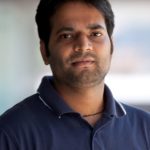 Prof.Abhishek Dixit, IIT Delhi
Prof.Abhishek Dixit, IIT Delhi
Title: Strategies for minimizing energy consumption in the access networks
Abstract: Energy consumption in telecommunication networks has been an active area of research in recent times and a lot of research papers have been published around this theme. Some major projects like GreenTouch have also considered minimizing the energy consumption in telecommunication networks. Access networks consume about 80% of the energy consumed in telecommunication networks, and thus major savings can be accrued by saving energy in access networks. In this talk, we will discuss major strategies that can be employed to minimize energy consumption in the access networks and will evaluate their typical savings.
Bio: Abhishek Dixit is presently assistant Professor in Dept. of Electrical Engineering, IIT Delhi (http://web.iitd.ac.in/~abhishek.dixit/home.html) and is also associated with the Bharti School of Telecommunications and Management, IIT Delhi. He worked for a semester as an assistant Professor in the School of Computing and Electrical Engineering, IIT Mandi and as a post-doctoral researcher at Ghent University, Belgium in 2015. He received the Ph.D. degree from Ghent University, Belgium in 2014 and M.Tech. degree in Optical Electronics and Optical Communication from the Indian Institute of Technology, Delhi (India) in 2010. During his Ph.D., he was involved in several European projects, like IST-OASE, Alpha, GreenTouch. Currently, he is also involved in government-funded sponsored projects, CONE (Converged Optical Network Evolution) from Dept. of Science and Technology, and Lifi networks, from dept. of Telecommunication, and consultancy projects from CEL and FTTH Council Asia Pacific. He received Early Career Research Award in 2016.
His research interests include lightwave, broadband optical access networks, and optical wireless communication systems and networks. He is author or co-author of more than 45 national and international publications, both in journals and in proceedings of conferences.
03.20 PM – 04.00 PM
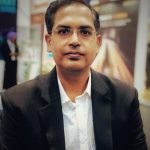 S.Ramakrishnan, Head of Technology, Nokia Networks
S.Ramakrishnan, Head of Technology, Nokia Networks
Bio: Ramakrishnan works with Nokia Networks as Head of Technology for Key customers in India market.
Ramakrishnan graduated in Electronics Engg with Distinction and completed his Master in Technology in E&ECE from Indian Institute of Technology, Kharagpur. Since graduation, Ramakrishnan has been associated with Hughes Group of companies for more than 11 years. He has held various engineering positions with techno-managerial responsibilities in the area of system design and development of the Satellite systems for LEO/GEO satellite constellation. He has also worked on System Engineering/standardization area and has been associated with development of specifications for 3G services over Satellite Constellations. Post his stint at Hughes, he has been associated with Nokia Networks, where he has been driving Product Management for 4G network components and Technology engagements for key customers in India market.
Ramakrishnan is active in research, in mathematical analysis of telecom networks with focus on Radio Resource Management, and QoS. He is an active member of IEEE and has been associated with IEEE Communications and Computer Society. He has served as a treasurer in Delhi CS Chapter Execom and as Secretary/Chair in the IEEE CS India Council Execom for the year 2013.
December 19, 2018
WORKSHOP 3 – 5G and Future Wireless Technologies
09.30 AM – 09.35 AM – Introduction to workshop by Dr.Navin Kumar
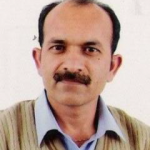 Dr. Navin Kumar, Assoc. Prof. Amrita Vishwa Vidyapeetham (University), Bangalore, Chair, ComSoc Bangalore Chapter. Sr. Member IEEE, IET(UK), IAENG(HK), IETE, IE(India) Global ICT Standardization Forum for India (GISFI)
Dr. Navin Kumar, Assoc. Prof. Amrita Vishwa Vidyapeetham (University), Bangalore, Chair, ComSoc Bangalore Chapter. Sr. Member IEEE, IET(UK), IAENG(HK), IETE, IE(India) Global ICT Standardization Forum for India (GISFI)
Bio: Dr Navin has over 20 years of industry and teaching experience which includes around 10 years of overseas experience in teaching and research and development. He has over 50 peer review journals and conference proceedings along with a book and book chapter. He has worked on many international EU projects. Currently he is an Associate Professor in ECE Dept. of Amrita School of Engineering, Amrita Vishwa Vidyapeetham,
Bangalore Campus. He often delivers tutorial and talk at major events including flagship conference IEEE ICC, WCNC.
His research areas are 5G Wireless Technology, mmWave Technology, Visible Light Communications, Intelligent Transportation Systems and Smart City
09.35 AM -10.00 AM
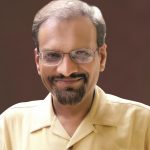 Dr.Sudhir Dixit, Senior Fellow and Evangelist, Basic Internet Foundation, Oslo, Norway – Head of US Operations
Dr.Sudhir Dixit, Senior Fellow and Evangelist, Basic Internet Foundation, Oslo, Norway – Head of US Operations
Title: IEEE Future Network Initiative: Enabling 5G and Beyond (Visionary Talk)
Abstract: Our society will continue to be more mobile and data-driven and everything, including voice communication, will run on data network, enabled by fast, unlimited wireless connectivity which would be ubiquitous and low cost. The next generation of network beyond 5G will emerge around 2030 to satisfy the unmet expectations of previous generations. It would be driven by network densification with wide range of wireless access technologies, spectrum sharing (both in the licensed and unlicensed band), cloud computing/virtualization, and will extensively utilize the technologies of AI, machine learning and block chain.
The quantity and variety of data will call for fundamentally new and innovative business models. Not only would the consumers benefit from the above advancements, the vertical industries would be the significant beneficiaries of the expected performance and cost improvements. These key future trends are driving the work of the IEEE Future Network Initiative and those of other national and regional projects on beyond 5G leading to 6G, such as the Academy of Finland Flagship project on 6G called 6Genesis, Wireless World Research Forum. This talk will present the work being done by the above initiatives and projects and will briefly describe the key technological advances that will drive beyond 5G and 6G mobile networks.
Bio: Recently, he also took on the role of International Liaison Manager of the Academy of Finland Flagship Programme, 6Genesis, led by the Centre for Wireless Communications, University of Oulu, Finland. From 2015 to 2017 he was the CEO and Co-Founder of a start-up, Skydoot, Inc. From 2009 to 2015, he was a Distinguished Chief Technologist and CTO of the Communications and Media Services for the Americas Region of Hewlett-Packard Enterprise Services in Palo Alto, CA, and the Director of Hewlett-Packard Labs India. Before joining HP, he held various leadership positions at BlackBerry, Nokia, NSN and Verizon Communications.
Sudhir Dixit has 21 patents granted by the US PTO and has published over 200 papers and edited, co-edited, or authored eight books. He has been a technical editor of IEEE Communications Magazine, and is presently the Vice Chair Americas, a Board Member & Working Group Chair at the Wireless World Research Forum (WWRF). He is also on the editorial boards of IEEE Spectrum Magazine, Cambridge University Press Wireless Series and Springer’s Wireless Personal Communications Journal. He is a Co-Chair of the Industry Engagement Committee and the DL Committee of the IEEE Future Network Initiative and is on its Industry Outreach Board (IOB). In 2018, he was appointed a Distinguished Lecturer by the IEEE Communications Society for a two year term.
From 2010 to 2012, he was an Adjunct Professor of Computer Science at the University of California, Davis, and, since 2010, he has been a Docent at the University of Oulu, Finland. A Life Fellow of the IEEE, Fellow of IET and IETE, Dixit holds a Ph.D. from the University of Strathclyde, Glasgow, U.K. and an M.B.A. from the Florida Institute of Technology, Melbourne, Florida.
10.00 AM – 10.25 AM
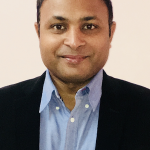 Anshuman Nigam, SAMSUNG R&D INSTITUTE, BANGALORE
Anshuman Nigam, SAMSUNG R&D INSTITUTE, BANGALORE
Title: The Key Building Blocks of 5G
Abstract: The talk will highlight the key use cases that will be made pervasive by 5G with an emphasis on the possible India centric use cases while providing a brief on the global 5G spectrum outlook. The talk will then introduce the key concepts incorporated in the 3GPP 5G NR Radio Standards that are vital for meeting the ITU technical requirements for Enhanced Broadband, Massive IoT and Ultra Reliability. In particular, the talk will focus on Millimeter wave channel characteristics, Frame Structure Design, Reference Signals, Initial Access, Control Channels & Data Channels and Power Saving Mechanisms. The talk will conclude by summarizing the ongoing efforts by Samsung in making 5G a commercial reality.
Bio: Anshuman Nigam is a Senior Principal Engineer, associated with Samsung R&D Institute India, Bangalore (SRIB) where he is jointly responsible for 5G NW Development & 5G 3GPP RAN Standards activities. He holds a graduate degree in electrical engineering from IIT Kanpur. While at Samsung he has actively worked in Research & Development of 5G, LTE & WiMAX technologies. He has served as a delegate from Samsung to 3GPP RAN2 & WiMAX2.0 Standards Groups from 2008 till 2014 post which he was responsible for developing of 5G Prototypes and 5G CPE. His current interest lies in evolving millimeter wave based 5G systems from niche field trials to widespread commercial reality.
10.25 AM – 10.50 AM
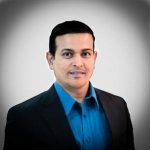 Subodh Gajare, Chief Architect, SDN, Cloud, IoT and Mobility – Cisco R&D center (Blore)
Subodh Gajare, Chief Architect, SDN, Cloud, IoT and Mobility – Cisco R&D center (Blore)
Title: 5G changing the game for Agriculture, Health Care, Smart Cities and Manufacturing verticals
Abstract: Mobile industry saw major inflection point in 2008 when Long Term Evolution (LTE) was introduced. Unlike LTE, 5G is completely different game plan with regards to use cases. 5G architecture is developed to support billions devices from IOT, enterprise, fixed, highly mobile and data hog end clients. LTE specification were mainly developed by 3GPP and ITU whereas for 5G many standard bodies like ITU, 3GPP, NGMN, ETSI, 5GMF and many more are working in parallel and mostly uncoordinated. One thing is for sure that 5G will be based on innovation in radio, core network and transport technologies
5G for the Networked Society 5G will enable enterprises to move into new markets and build new revenue streams with radically new business models and use cases, including massive IoT applications. 5G is the foundation for expanding the potential of the Networked Society. The move to 5G will add a new element: the industrial internet. We’ll see new “as-a-service” business models based on network slicing. Network slices in the context of 5G will be like virtual networks on-demand. 5G will enable more secure transactions and expand the battery life of IoT devices by 10X. All this will create opportunities for new use cases that we haven’t yet dreamed of.
Bio: Core experience:Platform Development, testing, validation, designing, operations and developing solutions across technologies. Designing and implement solutions for Service provider and Enterprise customers –
based on SDN/NFV, IoT, Mobility (3G to 5G transformation), Security, Virtualization, Cloud, designing s/w Orchestration platforms for end-2-end management of networks. Subodh is a Technical Leader for incubating IoT industry solutions – in Digital Manufacturing, Smart Cities, Health care, Education,Energy and Transportation. He works as advisor for grooming future Technical leaders/Architects in Cisco. He represents Cisco Networkers (now called Cisco Live) in Asia and US for past 14 years.
He speaks at Cisco Technical leadership Forum globally and in industry events for SDN, IPNGN, IoT and Security. He is highly engaged with SDO bodies and academia worldwide for developing open standards.
11.20 AM – 11.45 AM
Title: Challenges on the path to 5G era for industry verticals
Bio: A seasoned telecommunications professional with over 18 years of industry experience spanning 5G, RAN, business development, CEM analytics and product management.
He has been called upon many times to handle crisis, be it a customer case, a product gap or business transformation. He is an avid problem solver who goes straight to the root cause of a problem, finds alternate solutions, gets right people to work together to get out of the crisis and defines ways to prevent recurrence. He can dive into a new business area, understand the various facets of the business and in short time become a go-to person for any aspect of the business.
11.45 AM – 12.10 PM
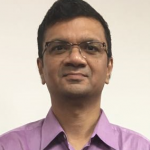 Ashutosh Deepak Gore, PhD, Qualcomm
Ashutosh Deepak Gore, PhD, Qualcomm
Title: Making 5G NR a reality
Abstract: This presentation will give an introduction to 5G NR (New Radio) – the unified air interface for the next decade and beyond. It will first cover the 5G NR foundational technologies (e.g. waveforms, framework, self-contained integrated subframe), and then get into the details of the different wireless technologies (e.g. mmWave, assive MIMO, and advanced coding design) that allows 5G NR to deliver more capabilities and higher efficiencies than today’s networks. We will also show the role Qualcomm is playing in making 5G NR a reality.
Bio: Ashutosh Deepak Gore obtained his B.Tech. and Ph.D. degrees from IIT Bombay, and M.S. degree from University of Hawaii, all in Electrical Engineering.
He worked in Nortel Networks, USA from 2000 to 2002. From 2008 onwards, he has worked in various semiconductor companies in India, viz. Marvell Semiconductor, Broadcom, Samsung R&D and Qualcomm. Presently, as Senior Staff Engineer/Mgr, his work in Qualcomm focusses on PHYsical layer algorithms and functional reference models for next generation (IEEE 802.11ax compliant) wireless local area networks.
12.10 PM – 12.35 PM
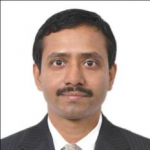 Subhas C Mondal, Chief Architect, Wipro
Subhas C Mondal, Chief Architect, Wipro
Title: Cognitive automation in 5G
Abstract: 5G network is expected to revolutionize the way we work in all industries. User centric networking and software based architecture in 5G is enabling realization of user requirements with a lot of ease. This is giving rise to the expectation that 5G will bring lot of benefits to the industry by reducing the operational expenses, improving response time to customer requirements and providing a better quality of experience to the users. Automation is one of the key enablers to realize this expectation. In this session, I will give an overview of some of the automation requirements from industry perspective, the role cognitive information processing will play and how it will help in achieving automation goals for the industry. The session also will give an overview of how cognitive information processing will play a key role in planning, building and operating the 5G network itself.
Bio: Subhas is the chief Architect for 5G at Wipro Limited. He is driving the architecture for the end to end 5G solutions across all the industry segments that Wipro cater to. Subhas is a Distinguished member of technical staff, IEEE Senior member and an IEEE distinguished speaker under Bangalore chapter. He holds 2 granted patents with more patent applications under processing. Subhas is an engineering graduate from IIT Kharagpur in Electronics and Electrical communication engineering.
12.35 PM – 01.00 PM
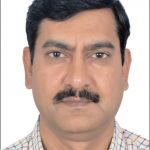 Rajesh Gandhi, Arista Networks
Rajesh Gandhi, Arista Networks
Title: Enabling new services with WiFi 6
Abstract: The latest version of WiFi technology called WiFi 6 or 802.11ax, brings significant improvements in various aspects of the wireless network, important one are –
• Increased Throughput per user and higher speeds
• improves upon latencies
• Reduced power consumption of the UEs very efficiently, thus improving the battery life
• OFDMA, enabling serving multiple users simultaneously
• Optimized for short packet transmissions
• Robust RF communication providing robustness (with higher symbol duration) protecting against interference/fading.
Also, the regulatory authorities allowed for more power transmission, allowing for more range.
All these improvements will enable several new services which can benefit from low latency, high throughput, increased range, short packet transmissions etc. IOT is one of the services, which fits the bill perfectly with such technological improvements. Likewise there will be several more which will be evolve in the industry as the benefits are realised by the users. The talk is going to provide insights on what are the improvements, how they are realised and how it will help in realisation of new services.
Bio: Telecom & Wireless professional with over 25 years of experience. Started career as IES officer from Indian Railways holding several senior positions and managed Telecom & signalling projects and operations. Had a long stint with Telcos like Reliance & Tata Teleservices, heading Applications development, Value added services and enterprise solutions. Currently handling one of the biggest WiFi installations across the world from planning and roll out, as part of Arista Networks.
01.00 PM – 01.30 PM
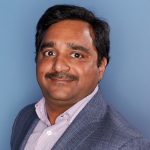 Dr.Puneet Sharma: Head, Networked Systems Group & Distinguished Technologist, Hewlett Packard Labs
Dr.Puneet Sharma: Head, Networked Systems Group & Distinguished Technologist, Hewlett Packard Labs
Title: 5G Core Considerations
Abstract: Communications Service Providers are embarking on transformation of their core networks for 5G initiatives. Viirtualization, programmability and automation are key pillars of this transformation. There is imminent need for automated resource flexing technologies for realizing an elastic and agile core network to meet the 5G demands. This presentation discusses considerations for 5G core including orchestration challenges. It will also articulate some architectural choices for service orchestration and resource allocation.
Bio: Dr.Puneet leads research on Edge2Core Infrastructure, software-defined networking (SDN), network function virtualization (NFV), cloud and datacenter networks, applied machine learning, IoT, mobility, and network monitoring. Prior to joining HP Labs, he received a Ph.D. in Computer Science from the University of Southern California and a B.Tech. in Computer Science & Engineering from the Indian Institute of Technology, Delhi. He has delivered Keynotes at various forums such as NFV World Congress 2016 and IEEE LANMAN 2014.
Puneet has also contributed to various Internet standardization efforts such as co-authoring UPnP’s QoS Working Group’s QoSv3 standard and the IETF RFCs on the multicast routing protocol PIM. He has published close to 100 research articles in various prestigious networking conferences and journals (Transactions on Networking, ACM SIGCOMM, ACM HotNets, USENIX NSDI, IEEE INFOCOM, etc.). His work on Mobile Collaborative Communities was featured in the New Scientist Magazine. He has been granted 30+ US patents. Puneet has been named Fellow of IEEE in 2014 for contributions to the design of scalable networking, software defined networks and energy efficiency in data centers. He was also recognized as a Distinguished Member of ACM for contributions to computing research.
02.00 PM – 04.15 PM
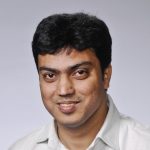 Tabrez Khan S: Senior Application Engineer, MathWorks India
Tabrez Khan S: Senior Application Engineer, MathWorks India
Title: Developing 5G Wireless Communications Systems Using MATLAB and Simulink
Bio: Tabrez Khan is a senior application engineer with MathWorks India specializing in design & implementation of signal processing and communications applications. He has over 15 years of industry experience and works closely with customers across domains to help them adopt MATLAB® and Simulink®. Prior to joining MathWorks, Tabrez worked for Cranes Software International Limited as an FAE, handling MathWorks and Lyrtech products.
Tabrez holds a bachelor’s degree in electronics and communications engineering from BIET, Davanagere, Kuvempu University and a master’s degree in digital electronics and communication from NMAMIT, Nitte, VTU.



